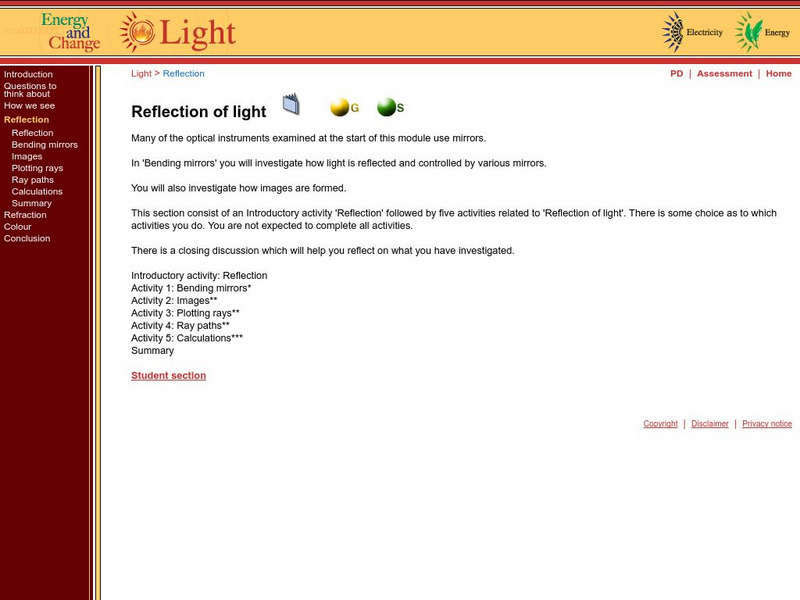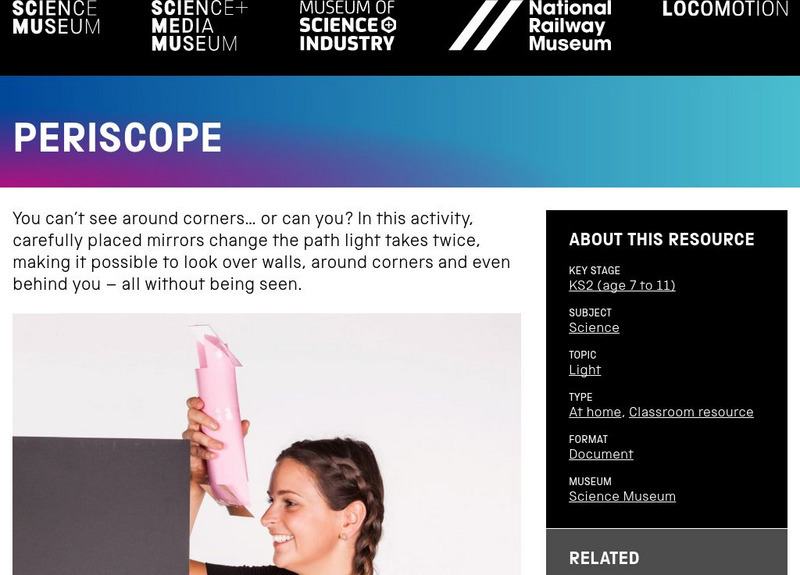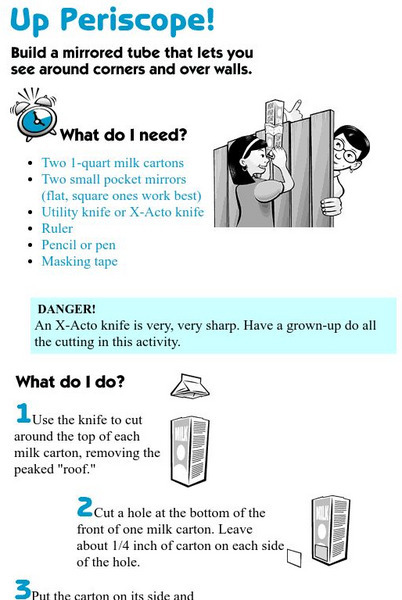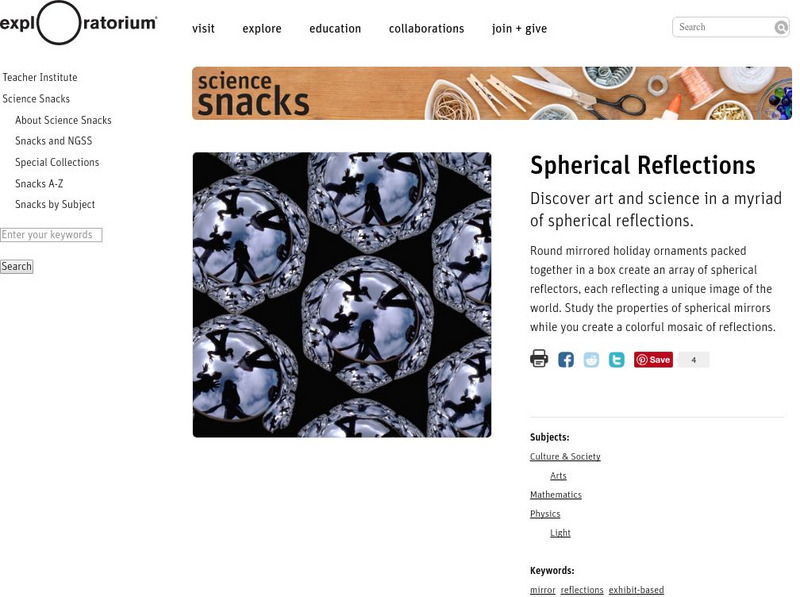Exploratorium
Cylindrical Mirror
Using flexible mirror-like paper, physical scientists experiment with images produced by curving it and looking into its reflective surface. They find that concave mirrors cause reflected light waves to cross and actually flip the image...
Curated OER
Reflection and Refraction
Life is only a reflection of what we allow ourselves to see. The lesson includes three experiments on light reflection, light refraction, projection, lenses, and optical systems. Each experiment builds off the ones before and...
Exploratorium
Antigravity Mirror
Is it a bird? Is it a plane? It's super student! Physical science stars can fly during a unit on light as they see the reflection of one leg in a mirror, behind which the other holds them up.
Exploratorium
Corner Reflector
If you set up a triad of mirrors into a corner figuration, they act as a kaleidoscope, bouncing light waves back and forth indefinitely, changing the light that your eyes perceive. Although the materials required are very specific and...
Exploratorium
Touch the Spring
Concave mirrors and the images they produce are traditional topics in the physics classroom. This resource explains how to set up an investigation of them, and it provides you with the explanation of concepts.
It's About Time
Reflected Light
The lesson allows young scientists to use lasers and mirrors to study reflected light. A reading passage and homework question assess learning, while additional material introduces extension activities.
Exploratorium
Parabolas
A parabolic mirror toy demonstrates how concave mirrors objects reflect light and produce a realistic image at their focal point. This resource probably doesn't explain any more than the printed insert that accompanies such an apparatus...
G. Turrell
Science Activity 2: Light & Sound
Little learners experiment with sunlight and map out how light travels. Using a mirror and slotted card, they find out about items that can reflect or absorb the light. They experiment with a variety of materials to find out how light...
Exploratorium
Hot Spot
Not only does a concave mirror focus light waves, it can also concentrate infrared radiation into a hot spot. If you have a small electric heater and such a mirror, demonstrate this for your physical science class.
Exploratorium
Polarized Sunglasses
Reflected waves of light move within a plane, and because of this, polarizing materials can reduce the glare our eyes see. This resource explains how to set up a demonstration of this effect. Consider it for use in your physical science...
Exploratorium
Vocal Visualizer
Make sound visible with an activity that provides directions for how to build a vocal visualizer meant to create light patterns. Making noise into the visualizer causes a mirror to vibrate, reflecting a laser beam, and creating...
Exploratorium
Exploratorium: Science Snacks: Physics/light
Here is a large collection of simple science class activities for understanding the physics of light.
My Science Site
Bj's Science: Discovering the Laws of Reflection [Pdf]
A hands-on science activity for teachers to do to help students explore light reflection.
Other
Reflection of Light
Educational site provides activities to compliment a unit on the reflection of light. Offers challenge activities that are designed to motivate and stimulate interest in the classroom.
Optical Society
Optical Society of America: Optics for Kids: Mirror, Mirror on the Wall
A simple experiment that clearly demonstrates angles of reflection when light hits a mirror. Accompanied by a good explanation of what's happening, and a link to an article on reflection.
Optical Society
Optical Society of America: Optics for Kids: Mirrors and Images
An experiment to investigate how many images appear as the angle between two hinged mirrors is increased. Accompanied by an explanation of what is happening, questions for students to consider, and a link to an article about reflection.
Science Museum, London
Science Museum: 360 Periscope
Make a 360 degrees periscope which uses mirrors to reflect light to see around corners.
Bill Nye
Bill Nye: Mirror, Mirror
In this tutorial, Bill Nye uses a mirror to help the learner understand how our brain processes images.
Exploratorium
Exploratorium: Science Snacks: Look Into Infinity
In this activity students will create images of images of images that can repeat forever. Students will recreate this effect by setting up two acrylic plastic mirrors.
Exploratorium
Exploratorium: Up Periscope!
Children can look around corners with this homemade periscope. Great instructions at this Exploratorium site on how to build a periscope.
TeachEngineering
Teach Engineering: Construct It!
Students use simple household materials, such as PVC piping and compact mirrors, to construct models of laser-based security systems. The protected object (a "mummified troll" or another treasure of your choosing) is placed "on display"...
Texas Instruments
Texas Instruments: Finding the Shortest Path
Students discover the shortest distance light travels from an object to the human eye, as the light from the object reflects off a single mirror. In the process they learn about reflection in a line, congruent angles, angle bisectors,...
Exploratorium
Exploratorium: Science Snacks: Spherical Reflections
Investigate the behavior of light that is reflected off a spherical mirrored surface.
Exploratorium
Exploratorium: Science Snacks: Touch the Spring
Explore the behavior of light as it reflects off a concave mirror in this optical illusion.










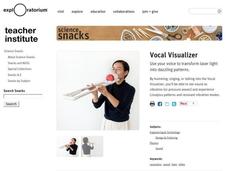
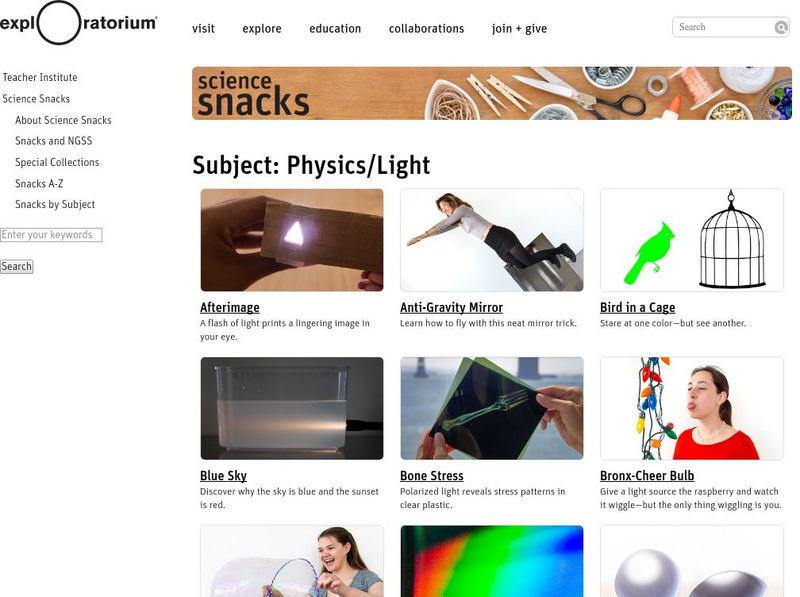
![Bj's Science: Discovering the Laws of Reflection [Pdf] Activity Bj's Science: Discovering the Laws of Reflection [Pdf] Activity](https://d15y2dacu3jp90.cloudfront.net/images/attachment_defaults/resource/large/FPO-knovation.png)
